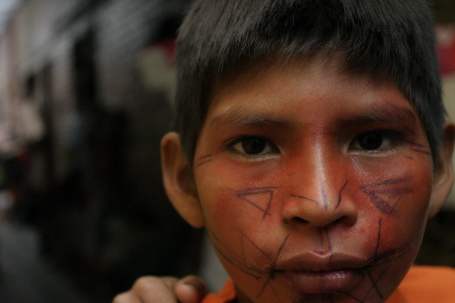by Noticia Independiente Colombia
Thursday, Dec. 30, 2004 at 10:56 PM
Four hundred Embera-Katio indigenous people have come to Bogotá from their distant lands in Cordoba near the Caribbean Coast of Colombia to demand that the Colombian government meet with them concerning the construction of the second hydroelectric dam on their lands. The first dam, ‘Urra 1’, flooded 7,400 hectares of land in 1999, destroying the rivers which were the source of food, transportation, and culture for the Embera-Katio people. Now the multinational (Canada, Sweden and Russia) company Urra plans to construct a second dam which would flood many more hectares.

pueblo_embera-katio_001.jpg, image/jpeg, 455x303
COLOMBIA: THE EMBERA KATÍO INDIGENOUS PEOPLE FIGHT MULTINATIONALS
DECEMBER 30, 2004
Interview and pictures by NOTICOL
Four hundred Embera-Katio indigenous people have come to Bogotá from their distant lands in Cordoba near the Caribbean Coast of Colombia to demand that the Colombian government meet with them concerning the construction of the second hydroelectric dam on their lands. The first dam, ‘Urra 1’, flooded 7,400 hectares of land in 1999, destroying the rivers which were the source of food, transportation, and culture for the Embera-Katio people. Now the multinational (Canada, Sweden and Russia) company Urra plans to construct a second dam which would flood many more hectares.
This is part of an interview with one of the organizers. Unfortunately this person has received death threats and therefore cannot be identified.
WHAT HAS BEEN THE EFFECT OF THE ‘URRA I’ DAM ON THE EMBERA-KATIO COMMUNITIES?
The major effect on the Embera–Katio people of the Alta Sinu has been the loss of the fish which is their principle source of protein. In addition, the fish were the main symbolic reference of the culture and when the fish were gone this reference disappeared. Contrary to the world tendency of better growth for children because of better diets, the children here are suffering from an increase in malnutrition. You can see that the children are now smaller and more malnourished because there are no fish in the area. Another problem is that the flooding for the dam has stimulated the reproduction of mosquitoes, increasing the prevalence of malaria. There has also been a rise in respiratory infections.
THERE ARE APPROXIMATELY 400 PEOPE FROM THE EMBERA-KATIO COMMUNITY HERE IN BOGOTA. CAN YOU TELL US WHY YOU ARE HERE?
On October 27th we took our protest to Monteria. We attempted to negotiate with the national government for a month. The government as well as the Urra Company refused to negotiate with us or come to any agreements. Due to this we decided to come to Bogota to talk with the government here and particularly with the Ministry of the Environment. The government has become subordinate to the interests of the Urra Company. The protest is focused on addressing environmental destruction as well as respect for human rights in the region.
WHAT BROUGHT YOU HERE FROM CORDOBA? WHAT ARE THE THINGS THAT YOU COULD NOT RESOLVE IN MONTERIA, CORDOBA?
Our meeting with the national government in Cordoba was fruitless. In fact it was a mockery of the Embera people. They wouldn’t listen to us and they paralyzed the discussions for 15 days. They didn’t even show up for the signing of the agreements with the Embera people. Because of this we came to Bogotá.
HAVE YOU HAD ANY ANSWERS FROM THE GOVERNMENT SINCE YOU HAVE BEEN HERE?
The police and military have responded by beating two pregnant women and a child. They came to expel us from the Ministry of the Environment at 3AM with orders to take us out of Bogota. It seems that this was an order by Sabas Peralt de la Vega and President Uribe because they don’t want anything to do with us.
WHY DOES THE GOVERNMENT NOT WANT ANYTHING TO DO WITH YOU?
Since Uribe’s government is looking toward re-election they want to hide social conflict from the Colombian society. Uribe is afraid that the country and the international community will realize that he is not guaranteeing the rights of the nation and even less the rights of marginalized groups like the indigenous communities.

